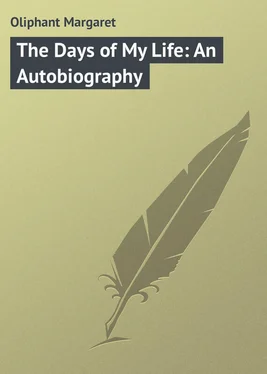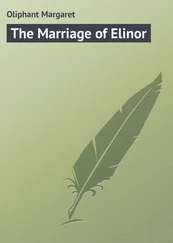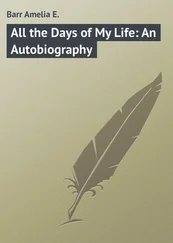Margaret Oliphant - The Days of My Life - An Autobiography
Здесь есть возможность читать онлайн «Margaret Oliphant - The Days of My Life - An Autobiography» — ознакомительный отрывок электронной книги совершенно бесплатно, а после прочтения отрывка купить полную версию. В некоторых случаях можно слушать аудио, скачать через торрент в формате fb2 и присутствует краткое содержание. ISBN: , Жанр: foreign_prose, на английском языке. Описание произведения, (предисловие) а так же отзывы посетителей доступны на портале библиотеки ЛибКат.
- Название:The Days of My Life: An Autobiography
- Автор:
- Жанр:
- Год:неизвестен
- ISBN:http://www.gutenberg.org/ebooks/43404
- Рейтинг книги:5 / 5. Голосов: 1
-
Избранное:Добавить в избранное
- Отзывы:
-
Ваша оценка:
- 100
- 1
- 2
- 3
- 4
- 5
The Days of My Life: An Autobiography: краткое содержание, описание и аннотация
Предлагаем к чтению аннотацию, описание, краткое содержание или предисловие (зависит от того, что написал сам автор книги «The Days of My Life: An Autobiography»). Если вы не нашли необходимую информацию о книге — напишите в комментариях, мы постараемся отыскать её.
The Days of My Life: An Autobiography — читать онлайн ознакомительный отрывок
Ниже представлен текст книги, разбитый по страницам. Система сохранения места последней прочитанной страницы, позволяет с удобством читать онлайн бесплатно книгу «The Days of My Life: An Autobiography», без необходимости каждый раз заново искать на чём Вы остановились. Поставьте закладку, и сможете в любой момент перейти на страницу, на которой закончили чтение.
Интервал:
Закладка:
“They say courting time is a happy time,” said Alice with a sigh, “it was not so then , Miss Hester. However, they all came to an explanation at last. I cannot tell you how it came about, but we heard one day that Mr. Brian was going abroad, and that Mr. Howard was betrothed to Miss Helen. I knew it before any one else, for my young lady trusted me; and when I saw your papa the next day, his face was glorious to behold, Miss Hester. I think he must have had as much joy in that day as most men have in all their lives, for I don’t think I ever saw him look quite happy again.”
“Alice!”
“My dear, it is quite true,” said Alice quietly, and with another sigh: “I could not tell for a long time what it was that made him so overcast and moody, and neither could my young lady. It could not be Mr. Brian, for Mr. Brian gave her up in the kindest and quietest way; you could not have believed how glad he was to sacrifice himself to his brother – and went away to the West Indies where your grandmamma had an estate, to look after the poor people there; so then the marriage was over very soon, and your grandpapa Southcote took the young people home to live with him at Cottiswoode, and any one that knew how fond he was of Miss Helen, would have thought Mr. Howard had got all the desire of his heart. But he had not, Miss Hester! The heart of man is never satisfied, the Bible says – and I have often seen your papa’s face look as black and miserable after he was married, as when he used to sit watching Mr. Brian and my poor dear young lady. Your mamma did not know what to think of it, but she always hung about him with loving ways and was patient, and drooped, and pined away till my heart was broken to look at her. Then she revived all at once, and there was more life in the house for a little while – she had found out what ailed him: but oh! Miss Hester, a poor woman may set her life on the stake to change a perverse fancy, and never shake it till she dies. Your papa had got it into his head that my young lady had married him out of pity ; and all her pretty ways, and her love, and kindnesses, he thought them all an imposition, my dear – and that is the reason why he says that hard, cruel saying, ‘Pity is a cheat!’”
“And then, Alice?” said I, eagerly.
“And then? there was very little more, Miss Hester – she was hurried out of this world when you were born; she had never time to say a word to him, and went away with that bitterness in her heart, that the man she had left father and mother for, never understood her. Death tries faith, my dear, though you know nothing of it! think how I stood looking at her white face in her last rest! Thinking of her life and her youth, and that this was the end of all; so carefully as she had been trained and guarded from a child, and all her education and her books, and such hopes as there were of what she would be when she grew up a woman; but soon I saw that she grew up only to die – God never changes, Miss Hester – he tries a poor woman like me very like the way he tried Abraham – and that was what I call a fiery passage for faith!”
“And my mother, Alice? and poor, poor papa! oh! how did he ever live after it?” cried I, through my tears.
“He lived because it was the will of God – as we all do,” said Alice, “a sad man, and a lonely he is to this day: and will never get comfort in his heart for the wrong he did my dear young lady – never till he meets her in heaven.”
At that moment Alice was called and went away. Poor, poor papa! he was wrong; but how my heart entered into his sufferings. I did not think of the bitterness of love disbelieved and disturbed, of my mother’s silent martyrdom – I thought only of my father, my first of men! He loved her, and he thought she pitied him. I started from my seat at the touch of this intolerable thought. I realized in the most overwhelming fulness, what he meant when he said, “Pity is a cheat!” Pity! it was dreadful to think of it – though it was but a mistake, a fancy – what a terrible cloud it was!
I will not say that this story filled my mind so much, that I do not recollect the other events of that day; on the contrary, I recollect them perfectly, down to the most minute detail; but they are all connected in my mind with my grief for my father – with the strange, powerful compassion I had for him, and some involuntary prescience of my own fate. For it was him I thought of, and never my mother, whom I had never seen, and whose gentle, patient temper was not so attractive to my disposition. No – I never thought he was to blame! I never paused to consider if it was himself who had brought this abiding shadow over his life. I only echoed his words in my heart, and clung to him, in secret, with a profound and passionate sympathy. Pity! I shuddered at the word. I no longer wondered at his haughty rejection of the slightest approach to it – for did not I myself share – exaggerate this very pride.
This mournful tedious day went on, and its dreary business was accomplished: all our belongings were taken away from Cottiswoode, and Alice and another servant accompanied them to set our new house in order before we came. Just before she went away, at noon, when the autumn day was at its brightest, I found Alice cutting the roses from my favorite tree. I stood looking at her, as she took the pale faint flowers one by one, but neither of us spoke at first: at last I asked her, “why do you take them, Alice?” and I spoke so low, and felt so reverential that I think I must have anticipated her reply.
I had to bend forward to her, to hear what she said. “They were your mother’s,” said Alice, “I decked her bride chamber with them, and her last bed. They are like what she was when trouble came.”
She had only left one rose upon the tree, a half blown rose, with dew still lying under its folded leaves, and she went away, leaving me looking at it. I felt reproved, I know not why, as if my young mother was crying to me for sympathy, and I would not give it. No! I went back hastily to the dreary half-emptied library where my father sat. My place was by him – this solitary man, who all his life had felt it rankling in his heart, that he was pitied where he should have been loved.
In the evening, just before sunset, I heard wheels approaching, and on looking out, saw the post-chaise which was to take us to Cambridge coming down the avenue. My father saw it also; we neither of us said anything, but I went away at once to put on my bonnet. It was dreadful to go into these desolate rooms, which were all the more desolate because they were not entirely dismantled, but still had pieces of very old furniture here and there, looking like remains of a wreck. After I had left my own room – a vague dusty wilderness now, with the damp air sighing in at the open lattice, and the loose jessamine bough beating against it, and dropping its dreary little leaves – I stole into the dining parlor for a moment to look at that picture which was like Edgar Southcote. I looked up at it with my warm human feelings, my young, young exaggerated emotions, full of resentful dislike and prejudice; it looked down on me, calm, beautiful, melancholy, like a face out of the skies. Pity, pity, yes! I hurried away stung by the thought. Edgar Southcote had the presumption to pity my father and me.
With a last compunctious recollection of my poor young mother, I went to the garden and tenderly brought away that last rose. I could cry over it , without feeling that I wept because Cottiswoode was my cousin’s and not mine. “I will always keep it!” I said to myself, as I wrapped some of the fragrant olive-colored leaves of the walnut round its stalk; and then I went in to my father to say I was ready. He had left the library, and was walking through the house – I could hear his slow heavy footsteps above me as I listened breathlessly in the hall. Whitehead, and the other servants, had collected there to say good-bye. Whitehead, who was an old man, was to remain in charge of the house; but all the others, except his niece Amy, were to go away this very night. While I stood trying to speak to them, and trying very hard not to break down again, my father came down stairs, went into the dining-parlor, and passed through the window into the garden. I thought he wished to escape the farewell of the servants, so I said good-bye hurriedly and followed him; but he was only walking up and down, looking at the house. He took my hand mechanically, as I came up to him, and led me along the walk in silence; then I was very much startled to find that he took hold of my arm, and leaned on it as if he wanted a support. I looked up at him wistfully when he paused at last — he was looking up at a window above; but he must have felt how anxiously my eyes sought his face, for he said slowly, as if he were answering a question, “Hester, I have lived here.” I did not dare to say anything, but I held very close to my heart my mother’s rose; he was thinking of her then, he was not thinking of pity nor of any bitterness.
Читать дальшеИнтервал:
Закладка:
Похожие книги на «The Days of My Life: An Autobiography»
Представляем Вашему вниманию похожие книги на «The Days of My Life: An Autobiography» списком для выбора. Мы отобрали схожую по названию и смыслу литературу в надежде предоставить читателям больше вариантов отыскать новые, интересные, ещё непрочитанные произведения.
Обсуждение, отзывы о книге «The Days of My Life: An Autobiography» и просто собственные мнения читателей. Оставьте ваши комментарии, напишите, что Вы думаете о произведении, его смысле или главных героях. Укажите что конкретно понравилось, а что нет, и почему Вы так считаете.












